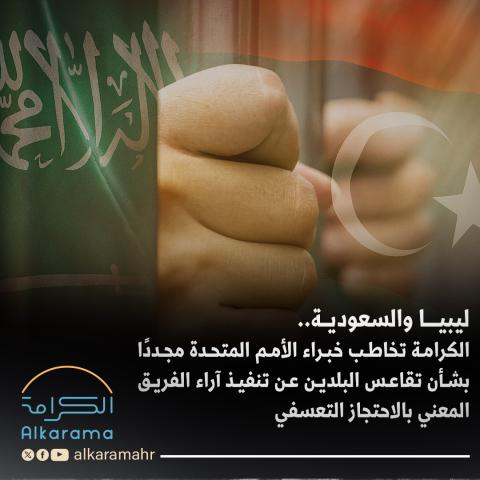
In a follow-up report addressed to the United Nations Working Group on Arbitrary Detention (WGAD), Alkarama denounced the persistent inaction of Libya and Saudi Arabia regarding the implementation of opinions issued between 2023 and 2025 concerning several cases of arbitrary detention.
Despite the findings of UN experts establishing serious violations of the right to liberty and calling for the immediate release of the victims, the provision of reparations, and the opening of independent investigations, no measures have been taken.
Families, as the sole sources of information in the face of the authorities’ silence, confirm the persistence of systematic violations: prolonged detention without charge or trial, inhumane prison conditions, denial of medical care, and a total absence of judicial safeguards.
Libya: institutionalized arbitrariness
In Libya, the emblematic case of Abdurrahman Abduljalil Mohamed Al-Farjani, arrested at the age of 17 and held without trial since 2014, illustrates the State’s persistent inability to comply with its international obligations. Despite the Working Group’s opinion calling for his release, he remains incarcerated in Al-Koufiya prison near Benghazi. The alarming deterioration of his health, due to the lack of medical care, reflects the drift of a penitentiary system that tramples human dignity and openly defies international law.
Saudi Arabia: criminalization of dissent
In Saudi Arabia, several emblematic cases reveal a clear political will to suppress any dissent and silence critical voices. The repression first targets leading religious figures, such as Salman Alodah, incarcerated for several years. Deprived of regular contact with his relatives and subjected to arbitrary restrictions, he suffers a blatant violation of his right to family life and communication.
It then extends to intellectuals and academics, such as Dr. Awad Al-Qarni, held in isolation under particularly harsh conditions and threatened with the death penalty for peacefully exercising his freedom of expression on social media. His case illustrates the direct criminalization of opinion and public debate.
The same repressive logic also affects foreign nationals, such as Bassam Al-Jalladi, a Yemeni citizen detained without a fair trial. Deprived of all contact with his family for over a year, he is denied both his fundamental procedural guarantees and his right to dignity.
Finally, the case of Mohsen Al-Awlaqi confirms the instrumentalization of the judicial system for repressive purposes. Even if his conviction is partially amended on appeal, it will still have been rendered in violation of the fundamental right to a fair trial. This illustrates how the judicial system is being exploited to lend an appearance of legality to the royal authorities' arbitrariness.
A challenge to international law
These situations, far from being “isolated cases,” reveal a systematic pattern of violations reflecting an outright disregard for international law and obligations under the International Covenant on Civil and Political Rights (ICCPR). By refusing to implement the Working Group’s opinions, Libya and Saudi Arabia undermine not only the fundamental rights of the victims but also the very credibility of the multilateral human rights protection system.
Alkarama emphasizes that the lack of cooperation from the States concerned constitutes a direct affront to international mechanisms and unnecessarily prolongs the suffering of the victims.
Through its follow-up report, Alkarama called on the Working Group to urge the States to immediately and unconditionally release all persons arbitrarily detained, to remind authorities of their international obligations, and to promote structural reforms to prevent the recurrence of such violations.
